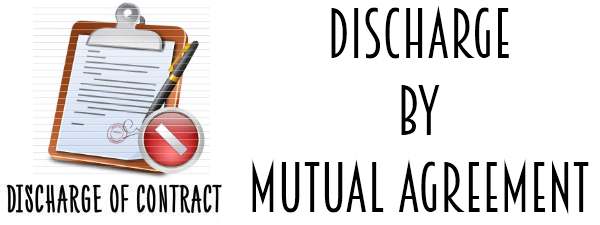Discharge of contract | By Performance | By Mutual Agreement
Table of Contents
Discharge of Contract by Performance
When the parties to a contract perform their respective promises, the contract is said to have been performed. This is the normal and natural mode of discharging a contract. When performance is proper and complete on either side, the parties become free from any further liability. If only one party performs what he promised, he alone gets a valid discharge, and he acquires a right of action against the other for non-performance.

Performance may be.
- Actual performance, or
- Offer to perform or tender.
1. Actual Performance: The contract is said to have been performed, if both the parties to the contract have performed their respective promises.
2. Offer to Perform or Tender: Tender is an offer to perform the obligation under the contract. When one party offers to perform its part of the promise and the other party refuses to accept the performance, the first party is discharged from its obligation provided the offer or tender to perform the contract was valid.
Discharge of Contract by Mutual Agreement

If both the parties to the contract, expressly or impliedly, agree to terminate the contract, the contract is said to have been discharged by mutual consent.
Example: A buys a scooter from B with the condition that if it’s working is not found satisfactory, he will return it within 10 days. A is not satisfied with the performance of the scooter and returns it to B within 10 days. The contract is discharged by mutual consent.
Ways Mutual discharge of contract takes place
Mutual discharge of a contract may take place in any of the following ways:
1. Novation: Novation means substitution of a new contract in place of the old one. It creates a new contract in exchange of the old contract. It discharges the old i.e., the original contract. New contract here may be either between the same parties or between different parties, the consideration being mutually the discharge of the old contract.
2. Alteration: Alteration of a contract means change in one or more of the terms of a contract. Alteration is valid, if it is done with the consent of all the parties to the contract. In such a case, the old contract is discharged.
3. Remission: Remission means the acceptance of less than what was contracted for.
4. Rescission: Rescission means cancellation of all or some of the terms of a contract. It may occur under various circumstances such as
- By mutual consent of the parties, or
- Where a party to a contract fails to perform his obligations, the other party can rescind the contract without prejudice to his rights to receive compensation for breach of contract.
- In case of a voidable contract, one of the parties has the option to rescind it.
5. Waiver: Waiver means “Abandoning” the rights. When a party to the contract abandons or waives his rights, the contract is discharged. Here, both the parties mutually agree that they shall no longer be bound by the contract. It amounts to a release of parties from their contractual obligations.
6. Merger: Merger denotes coinciding and meeting of an inferior and superior right in one and the same person. In such a case, inferior right available to a party under an agreement will vanish automatically.


Yes.it’s a good site and i would like you to send for me summarised notes on discharge from performance